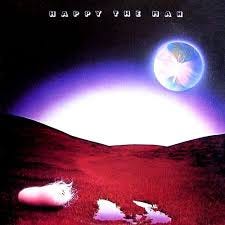The list of “American progressive rock bands of the 1970s” might not be deep enough to fill a Jeopardy category. The Brits did most of the heavy lifting early in the decade; U.S. contributions to the canon wind up sounding feckless and deliberately imitative, a saucerful of genre tropes.
Among the exceptions: Happy the Man. The Virginia-based five piece was signed by Clive Davis to Arista Records and released its debut, which was produced by Ken Scott (Mahavishnu Orchestra, Supertramp, many others), in 1977. The music on that record and its followup, Crafty Hands (1978), ascends to the thunder of the best orchestral prog – there are synths stacked in dense layers, and agitated ensemble sections built around fast-changing metric convulsions. These sometimes register as little music-nerd dares: “Count This!”
Tucked between the polyrhythmic themes are torrid (and often brief) solo statements, and they’re the reason Happy the Man was so mind-bending in live performance. As new, sonically upgraded versions of the band’s two primary releases show, keyboardist Kit Watkins and guitarist Stanley Whitaker could be delightful improvisors, bringers of the unexpected as well as the dizzying. Both are technically gifted but treat chops as secondary to cultivating melodies — theirs have a scampering liveliness, at times suggesting a lyricism similar to that of romantic-era composers.
And both soloists share a penchant for the dramatic entrance: On “Stumpy Meets the Firecracker in Stencil Forest,” Watkins and Whitaker take turns transforming the short solo passages into stupendous jolts of rapidly accruing energy. These fast-motion bursts carry an argument with them: Sometimes the revered legends of progressive rock conflated “epic solos” with “longwinded noodling.”
Crafty Hands, which was recorded after Happy the Man’s most extensive touring, is more complex, compositionally and texturally. The performance experience led the band to think in terms of longer arcs and more gradual development sections; “Morning Sun” and “Open Book” unfold as Satie-like pastorales, while “Service With a Smile” incorporates the heaving dramatic flourishes of arena rock.
Extensive liner notes on the new set – by former record executive and current Substack scribe Syd Schwartz – explain that the initial Happy the Man releases were inferior to the sounds band heard on playback in the studio. This became, not surprisingly, an ongoing issue for the band: It’s taken decades (and help from an angel investor) for the musicians to gain control of the masters in order to rectify the audio problems. The effort was worth it: Those familiar with Happy the Man’s music (from repeat listening to the limited-frame original releases) will be astonished by the vividness, low-end heft and wide dimensionality of these remasters.
**
Should you find yourself needing a palette-cleansing corrective to Happy the Man’s complexities, there are now two significantly upgraded remasters of 50-year-old gems from Robin Trower, the canny purveyor of blues-rock psychedelia. Trower’s breakthrough Bridge of Sighs appeared last year in expanded form, with outtakes, a new stereo mix and (somewhat erratic) live performances. The followup For Earth Below (1975), just got the same treatment, but with much more intense live stuff. The 2025 Stereo Mix, example below, clarifies the album’s gritty funk sonics just enough to demand some re-evaluation. Which this record deserves.






Happy the Man was a great band. We played their records all the time on WXPN's old Diaspar show. Kit Watkins was also in a late edition of Camel. He went on to release several great solo albums. For me the go-to Trower album is still the first, Twice Removed from Yesterday followed by Bridge of Sighs. I never loved the rockers, but those slow motion psychedelic blues tracks with the guitar just moaning and dripping trails of acid still kill me.
My dear old pal Stu Fine signed them to Arista Records.